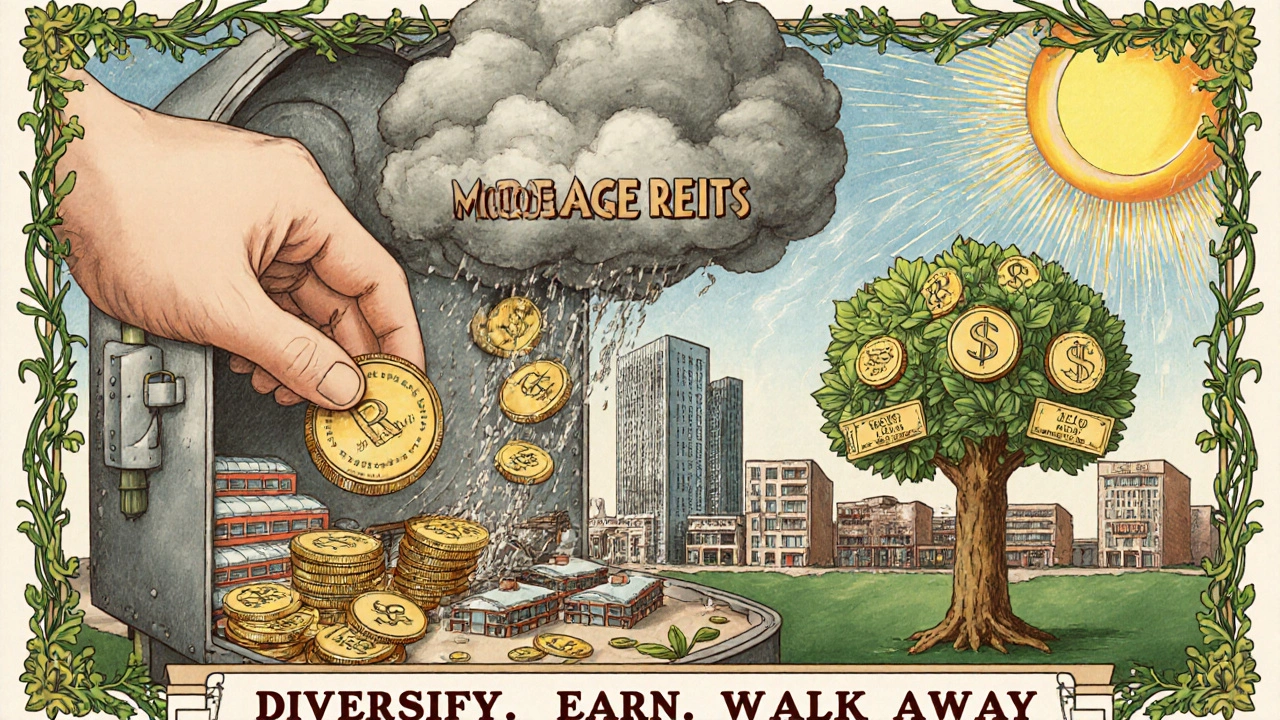REIT Income Calculator
Calculate Your REIT Income
REIT Income Guide
The average REIT yield in 2023 was 3.87%, compared to the S&P 500's 1.51%.
Consider these factors:
- Equity REITs typically offer 3-7% yield
- Mortgage REITs can offer 8-10% yield but with higher risk
- Office and retail REITs may have lower yields (3-5%)
- Industrial and data center REITs often pay 4-6% yield
The article suggests focusing on REITs with payout ratios below 80% of FFO for better sustainability.
Your Estimated Income
Want to own part of shopping malls, data centers, or apartment buildings without dealing with tenants, repairs, or down payments? That’s what REITs do. Real Estate Investment Trusts let you invest in real estate like you would in stocks-buy shares, get paid rent, and walk away. No lawn mowing. No leaky roofs. Just dividends and potential growth.
What Exactly Is a REIT?
A REIT is a company that owns or finances income-producing property. Think office towers, warehouses, apartment complexes, hospitals, or even cell phone towers. Instead of buying one building yourself, you buy a share of a company that owns hundreds. The U.S. government created REITs in 1960 so regular people could access commercial real estate without needing millions. To qualify as a REIT, a company must follow strict rules:- At least 75% of its assets must be in real estate
- At least 75% of its income must come from rent or mortgage interest
- It must pay out at least 90% of its taxable income as dividends to shareholders
Two Main Types of REITs: Equity vs. Mortgage
Not all REITs are the same. There are two big categories:- Equity REITs (90% of the market): These own and operate physical properties. They make money from rent. Examples: Apartment Building REITs (AVB), Industrial REITs (PLD), Data Center REITs (DLR).
- Mortgage REITs (mREITs): These don’t own buildings. They lend money to real estate owners or buy mortgage-backed securities. They make money from interest payments. Examples: Annaly Capital (NLY), Starwood Property Trust (STWD).
How REITs Compare to Buying Property Directly
Buying a rental house sounds simple. But here’s what you actually deal with:- $50,000-$100,000 down payment
- Property taxes, insurance, repairs
- Screening tenants, handling complaints, evictions
- Selling takes months, and you pay 6% in commissions
- Buy one share for $50
- Get paid rent every quarter
- Sell anytime during market hours
- Own pieces of 50+ buildings across the country
Where REITs Shine: Income and Diversification
In 2023, the average REIT yielded 3.87%. The S&P 500? Just 1.51%. That’s more than double the income. For retirees or anyone needing regular cash flow, that matters. REITs also help reduce portfolio risk. Over the last 20 years, REITs moved independently of the stock market. Their correlation with the S&P 500 was only 0.37. That means when stocks drop, REITs often hold steady-or even rise. Morningstar found that adding 5-10% REITs to a portfolio improved risk-adjusted returns by 1.2% per year. That’s not flashy, but over 10 years, it adds up to tens of thousands in extra growth.The Dark Side: Dividend Cuts and Market Risks
REITs aren’t immune to trouble. During the pandemic, mall REITs got crushed. Foot traffic vanished. Rents dropped. Some companies cut dividends by 60-90%. Take Macerich (MAC). In 2023, it slashed its dividend from $1.32 to $0.45 per share. Investors who counted on that income for retirement got blindsided. Why? Because some REITs paid out more than they earned. A payout ratio above 80% of Funds From Operations (FFO) is risky. CBL & Associates paid out 105% of FFO before collapsing in 2022. Mortgage REITs face another risk: interest rates. When the Fed hikes rates, mREITs borrow more expensively. Their spreads shrink. Annaly Capital, for example, increased its interest rate hedges from 45% to 78% between 2022 and 2023 just to survive. And don’t ignore non-traded REITs. These aren’t listed on exchanges. They promise high yields but lock your money in for years. The IMF warned in 2023 that $153 billion in non-traded REITs could cause liquidity crises if investors panic and try to cash out at once.Top REIT Sectors to Watch in 2025
Not all real estate is equal. Some sectors are booming. Others are struggling.- Industrial & Logistics (13.9% of REIT market): Warehouses near cities. E-commerce keeps growing. Prologis and Duke Realty are leaders.
- Data Centers (2.9% but growing fast): AI needs servers. Digital Realty and Equinix are riding the wave. Expect 12-15% annual growth through 2027.
- Residential (14.2%): Apartment REITs like AvalonBay (AVB) raise rents 5% a year. Demand stays strong in cities.
- Healthcare (12.3%): Senior housing and medical offices. Aging population = steady demand.
- Office (11.3%): Struggling. Vacancy rates hit 19.6% in late 2023. Many leases expire between 2024-2026. Avoid unless it’s a top-tier building in a strong city.
- Retail (13.7%): Mixed bag. Strip malls with grocery anchors are fine. Big malls? Not so much.
How to Invest in REITs
You don’t need to pick individual REITs. Most people do better with funds:- REIT ETFs: Low cost, diversified. Examples: VNQ (Vanguard REIT ETF), IYR (iShares U.S. Real Estate ETF). Expense ratios: 0.12%-0.45%.
- Individual REITs: Only if you’ve done your homework. Look for low debt, strong occupancy, and FFO payout ratios under 80%.
- REIT mutual funds: Higher fees (0.8%-1.25%), but some offer active management.

What to Watch: FFO, AFFO, and NAV
Forget earnings per share. REITs use different metrics:- FFO (Funds From Operations) = Net income + depreciation + amortization - gains from property sales. This shows real cash flow.
- AFFO (Adjusted FFO) = FFO - recurring maintenance costs. Better measure of sustainable income.
- NAV (Net Asset Value) = Estimated value of all properties minus debt. Compare NAV to share price. If the stock trades below NAV, it might be undervalued.
Real Investor Stories
Reddit user u/DividendSeeker2022 holds Realty Income (O). Since 1997, it’s raised dividends 104 times. “I’ve lived through three recessions,” they wrote. “I don’t worry about the stock price. I get paid every month.” Another user, u/ApartmentREITs, said: “AVB raised rents 5% a year for five years. My AFFO grew 28%. I never had to fix a toilet.” But not everyone wins. On Seeking Alpha, one investor wrote: “MAC’s dividend cut destroyed my retirement plan.” They held for seven years. Then it vanished.Should You Invest in REITs?
Yes-if you want:- Passive income without managing property
- Diversification beyond stocks and bonds
- Liquidity (sell anytime)
- Exposure to real estate without $100K down
- Want to control your assets
- Believe real estate always goes up
- Can’t handle dividend cuts
- Want to avoid taxes on dividends (they’re taxed as ordinary income)
Are REITs a good investment for retirees?
Yes, if they’re used correctly. REITs offer reliable monthly or quarterly dividends, which many retirees rely on for income. Companies like Realty Income (O) have raised dividends for over 25 years straight. But retirees should avoid high-risk REITs like mortgage REITs or those with payout ratios above 80%. A portfolio with 5-10% in low-volatility equity REITs (like apartment or industrial) can boost income without wrecking the portfolio.
Can you lose money in REITs?
Absolutely. REIT share prices can drop during market downturns, interest rate hikes, or sector crashes. In 2020, hotel and mall REITs lost 40-60% of their value. Some cut dividends entirely. Even strong REITs like Simon Property Group fell 30% during the pandemic. REITs are not risk-free-they’re just less risky than owning one property outright.
How are REIT dividends taxed?
Most REIT dividends are taxed as ordinary income, not qualified dividends. That means they’re taxed at your regular income tax rate-up to 37% federally. A portion may be classified as return of capital (tax-deferred) or capital gains (lower rate), but the majority is ordinary. You’ll get a 1099-DIV form each year showing the breakdown.
What’s the difference between a REIT and a real estate ETF?
A REIT is a single company that owns real estate. An ETF (like VNQ) holds a basket of many REITs. So if you buy a REIT, you’re betting on one company. If you buy a REIT ETF, you’re spreading your risk across 50-100 REITs. ETFs are cheaper, more diversified, and easier for beginners. Most people should start with an ETF.
Do REITs pay dividends monthly or quarterly?
Most REITs pay dividends quarterly. But a few, like Realty Income (O), pay monthly. Monthly payouts can help with budgeting, especially for retirees. Monthly payers are rarer and often more expensive to buy. But if consistent cash flow matters to you, they’re worth considering.
Is now a good time to buy REITs in 2025?
It depends on the sector. Office REITs are still struggling with high vacancies. But industrial, data centers, and residential REITs are doing well. Interest rates have stabilized, which helps. REITs are trading at discounts to their net asset value (NAV) in many cases, making them potentially attractive. Look for REITs with strong balance sheets, low debt, and rising rents. Avoid those with high payout ratios or heavy reliance on retail or malls.

RAHUL KUSHWAHA
I've been buying VNQ for my retirement portfolio since 2020. Monthly dividends from Realty Income? Game changer. No more stressing about tenants or leaky roofs. Just check my app and see cash in my account. 😊